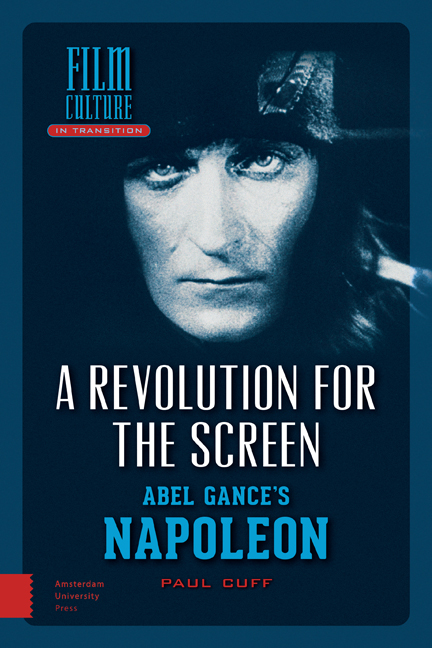Book contents
- Frontmatter
- Dedication
- Contents
- List of Illustrations
- Note on Formatting
- Acknowledgements
- Foreword
- Preface: Critical perspective
- 1 Napoleonic Ambition and Historical Imagination
- 2 Shaping Expectations: The Young Napoléon Bonaparte
- 3 Civilization and Savagery: Visions of the French Revolution
- 4 Mortal Gods: Voices of Power and of Providence
- 5 The Dark Light of Napoleonic Cinema
- 6 A View from the Margins of History
- 7 Melodrama and the Formulations of Family
- 8 Worlds in Transition: Class, consumption, Corruption
- 9 Death and Transfiguration
- Conclusion: The Case for Enthusiasm
- Filmography and Bibliography
- Index
- Film Culture in Transition
Foreword
Published online by Cambridge University Press: 10 December 2020
- Frontmatter
- Dedication
- Contents
- List of Illustrations
- Note on Formatting
- Acknowledgements
- Foreword
- Preface: Critical perspective
- 1 Napoleonic Ambition and Historical Imagination
- 2 Shaping Expectations: The Young Napoléon Bonaparte
- 3 Civilization and Savagery: Visions of the French Revolution
- 4 Mortal Gods: Voices of Power and of Providence
- 5 The Dark Light of Napoleonic Cinema
- 6 A View from the Margins of History
- 7 Melodrama and the Formulations of Family
- 8 Worlds in Transition: Class, consumption, Corruption
- 9 Death and Transfiguration
- Conclusion: The Case for Enthusiasm
- Filmography and Bibliography
- Index
- Film Culture in Transition
Summary
When you read someone's opinions of a film and you wish you’d thought of them yourself, that writer is worth keeping an eye on. So often, descriptions of films are written in such an impenetrable language that you need a dictionary – and sometimes the word is so obscure you won't find it. I was impressed by Paul Cuff because he is not only a critic, not only a historian. He is an enthusiast who believes in action. When a new four-and-a-half-hour version of LA ROUE (1922) was released on DVD, he realized vital elements were missing. So he rounded up all available elements of this monumental film and produced a six-hour alternative (see Cuff 2011). It proved once again that the more you put back into a Gance silent, the better it gets.
‘Come with me to Paris and I will show you a Gance film no one thought existed’, said Cuff one day. I could hardly turn down such an offer, which brought back memories of my early forays as a film collector. We reported to one of the forts built after the Franco-Prussian war to protect Paris, which already had an atmosphere of buried treasure, and were taken to a bunker in which a viewing machine awaited with a pile of cans. To my amazement, the film was one that Gance shot during the First World War but never assembled. It wasn't exactly an ideal subject for wartime audiences; a holy man from India comes to Europe with a message of peace and endures brutality from both sides.
ECCE HOMO (1918) was photographed by the great cameraman Léonce- Henri Burel, and watching it in rushes form made one long to see it on the big screen. The print had been made direct from the camera negative and was as sharp as any original. It had been filmed in the South of France, where the climate is similar to Hollywood’s. But the production had been closed down by Pathé when the leading actor was called. Gance then moved on to his first masterpiece, J’ACCUSE! (1919).
Enthusiasm is not a quality one often encounters in academic writing. One feels they regard film history as dangerously close to trainspotting.
- Type
- Chapter
- Information
- A Revolution for the ScreenAbel Gance's Napoleon, pp. 19 - 22Publisher: Amsterdam University PressPrint publication year: 2015



